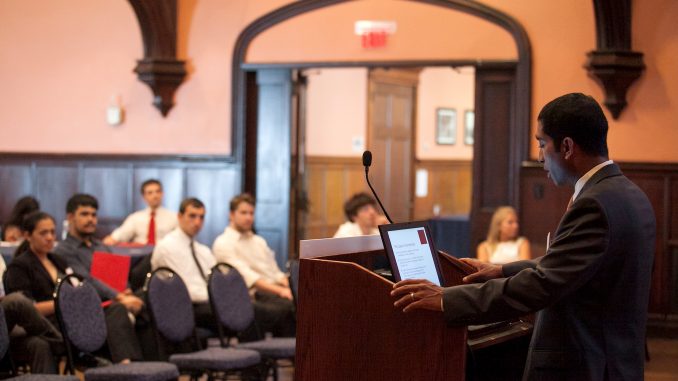
When it comes to free speech on college campuses, Azhar Majeed believes standing up for students’ First Amendment rights is vital—especially in Philadelphia, the birthplace of the Constitution.
Majeed, director of the Individual Rights Education Program at the Foundation for Indiviudal Rights in Education, said as a public university, Temple has a responsibility to allow students to openly express themselves given those rights.
“The First Amendment is not optional on a public university campus,” Majeed said. “Temple should be fully aware that it’s bound by the First Amendment, both with respect to students as well as professors.”
Majeed was one of the co-authors of an Aug. 19 op-ed in the Inquirer that criticized Temple and Drexel for both institutions’ free speech codes. The piece cites a specific example of Temple’s student conduct code, which said students could face disciplinary action for “Participation in a dissolved or unrecognized student organization.”
A university spokesman said that the op-ed contained “incorrect information,” and that a revised student conduct code was posted without the provision online last month. As of Monday night, the provision was still in the code via the university’s student conduct and community affairs website.
Another example of free speech restriction that Majeed cited in his op-ed was a sexual-harassment policy case that the university lost in 2008. In that case, former student Christian DeJohn sued Temple for having an unclear policy on sexual harassment. He argued it restricted him from voicing his opinion on women in the military and in combat during classroom discussion.
During the lawsuit, Temple revised its policy and appealed the decision, but three circuit judges from the U.S. District Court in Philadelphia ruled in favor of DeJohn and his First and Fourteenth Amendment rights.
The policy in question during the lawsuit read, “all forms of sexual harassment are prohibited, including . . . expressive, visual, or physical conduct of a sexual or gender-motivated nature, when . . . (c) such conduct has the purpose or effect of unreasonably interfering with an individual’s work, educational performance, or status; or (d) such conduct has the purpose or effect of creating an intimidating, hostile, or offensive environment.”
According to the university’s current policy, which was last updated in July, much of that provision remains unchanged. However, the university has taken steps to make it more accessible, including creating a website last month dedicated to the issue.
But Majeed said this ruling seven years ago shows how Temple still has some work to do when it comes to free speech—specifically, the vagueness of some of its policies, including sexual harassment.
“Most of it’s fine, because it defines sexual harassment in accordance with its legal definition,” he said. “But then it has this broad provision about sexually suggestive or intimidating remarks … and a lot of discussion and academic and non-academic could be considered sexually suggestive, but that doesn’t mean it’s sexual harassment.”
Majeed added that one of the most common problems he faces when discussing these free speech issues at college campuses is students not caring about the issue.
But it just takes one instance for anyone to become involved, he said.
“All it takes is the wrong case with the wrong person in the wrong place,” he said. “And all of a sudden, you find that speech code enforced against you.”
Steve Bohnel can be reached at steve.bohnel@temple.edu or on Twitter @Steve_Bohnel.


Be the first to comment